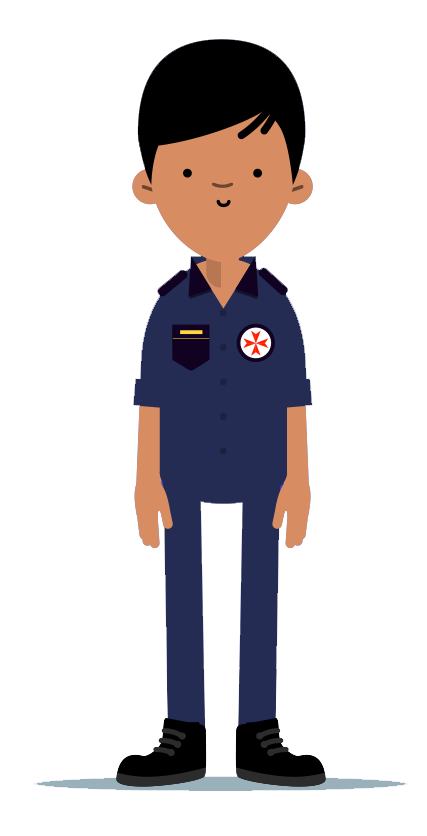If you’re a
paramedic it pays
to learn what you
can claim
To claim a deduction for work‑related expenses:
• you must have spent the money yourself and weren’t reimbursed
• it must directly relate to earning your income
• you must have a record to prove it.*

You can only claim the work‑related portion of an expense.
You can’t claim a deduction for any part of an expense that does not directly relate to earning your income.
* You can use the myDeductions tool in the ATO app to keep track of your expenses and receipts throughout the year.
Car Expenses
You can’t claim the cost of normal trips between home and work, even if you live a long way from your usual workplace or have to work outside normal business hours – for example, weekend or early morning shifts.
You can claim the cost of using a car you own when you drive:
- directly between separate jobs on the same day – for example, from your first job as a paramedic to your second job as a first aid trainer
- to and from an alternate workplace for the same employer on the same day – for example, travelling from your ambulance station to a meeting at head office
- from home directly to an alternate workplace – for example, travelling from home to work at a station other than your normal station for the day.
If you claim car expenses, you can use the logbook method or the cents per kilometre method to calculate your deduction.
If you use the logbook method, you need to keep a valid logbook to work out the percentage of work‑related use along with written evidence of your car expenses.
If you use the cents per kilometre method, you need to be able to show how you calculated your work‑related kilometres and that those kilometres were work related.
If you claim your work‑related car expenses using one of the above methods, you can’t claim any further deductions in the same tax return for the same car. For example, petrol, servicing, and insurance costs.
Clothing and Laundry Expenses
(incl footwear)
With a few exceptions, clothing can’t be deducted as a work‑related expense.
You can claim the cost to buy, hire, repair or clean clothing if it is:
- protective – clothing which has protective features or functions that you wear to protect you from specific risks of injury or illness at work.
- a compulsory uniform – you are explicitly required to wear it by a workplace agreement or policy, which is strictly and consistently enforced, and is sufficiently distinctive to your organisation.
You can’t claim the cost to buy, hire, repair or clean conventional clothing you wear for work, even if your employer requires you to wear it and you only wear these items of clothing at work. ‘Conventional clothing’ is everyday clothing worn by people – for example, gym attire, plain shirts or sneakers.
You can’t claim a deduction if your employer pays for or reimburses you for these expenses.
Travel Expenses
You can claim travel expenses if you travel away from your home overnight in the course of performing your employment duties – for example, travelling interstate to attend a conference. Travel expenses can include meals, accommodation, fares and incidental expenses you incur when travelling for work.
You can’t claim a deduction if the travel is paid for, or you are reimbursed by your employer or another person.
Meal and Snack Expenses
You can’t claim the cost of food, drink or snacks you consume during your normal working hours, even if you receive an allowance. These are private expenses.
If you receive an overtime meal allowance under an industrial law, award or agreement and it’s included in your assessable income, you can claim the cost of the meal that you buy and eat when you work overtime.
Fitness Expenses
You can’t claim fitness expenses, such as gym fees, to maintain your fitness.
In very limited circumstances, you can claim fitness expenses if your role requires you to maintain a fitness level well above the normal paramedic standard and strenuous physical activity is an essential and regular part of your work. For example, paramedics who work in specialist rescue operations and are regularly tested on their fitness, such as vertical access (cliff and building), white water survival and snowfield work.
Other Expenses
You can claim the work‑related portion of other expenses that relate to your employment, including:
- phone and internet costs, with records showing your work‑related use
- sunscreen, sunhats and sunglasses where your duties require you to spend prolonged periods working outdoors
- union and professional association fees
- tools and equipment, such as a stethoscope or a pin watch (if these items cost more than $300, you must claim the cost over a number of years (decline in value))
- additional costs you incur to renew a special licence or condition on your licence in order to drive the ambulance vehicle – for example, a heavy vehicle permit
- personal protective equipment you buy, such as gloves, face masks, sanitiser or anti‑bacterial spray, as your job required close proximity with patients.
You can’t claim private expenses such as:
- getting or renewing your driver’s licence
- attending social functions
- haircuts or grooming
- rent or other living expenses – even if you are working at a different station or a remote location for an extended period
- flu shots and other vaccinations, even if you’re required to have them for work.
You can’t claim a deduction if the cost was met or reimbursed by your employer.
This is a general summary only.
For more information, contact us.

